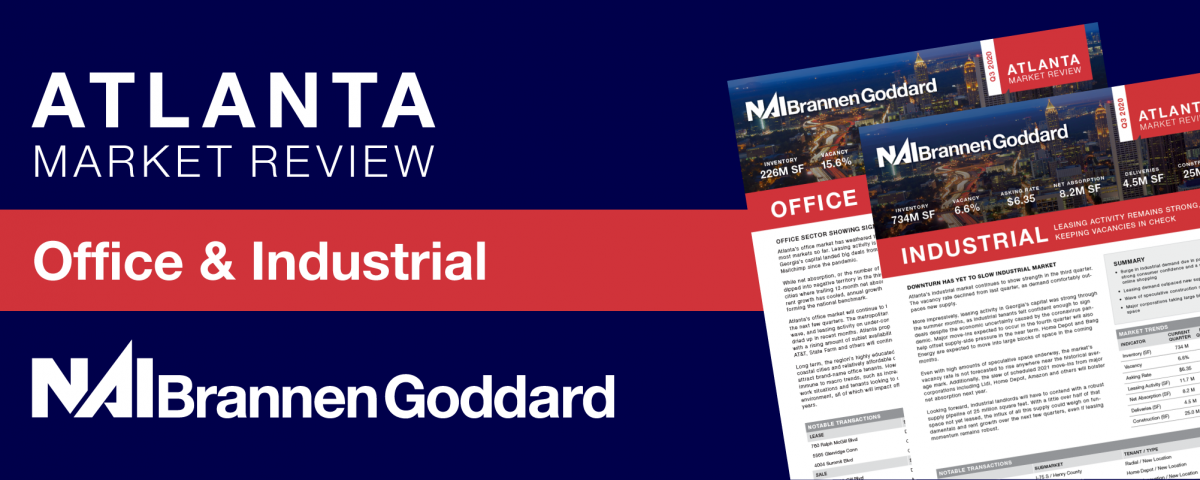
Mike Berens and Logan Haner Represent Oversight Systems in Move to Pennant Park
October 6, 2020
Austin Brannen and Matt Bentley to Lease LogistiCenter at Miller Road for Dermody Properties
October 21, 2020Atlanta Office & Industrial Market Reviews: Q3 2020

THIRD QUARTER, 2020
Atlanta’s office market has weathered the coronavirus storm better than most markets so far. Leasing activity is still weaker than normal, but Georgia’s capital landed big deals from Microsoft, Deluxe Corp, and Mailchimp since the pandemic.
While net absorption, or the number of move-ins versus move-outs, dipped into negative territory in the third quarter, Atlanta is one of the few cities where trailing 12-month net absorption is still positive. And though rent growth has cooled, annual growth remains positive and is outperforming the national benchmark.
Atlanta’s office market will continue to face significant challenges over the next few quarters. The metropolitan area faces a significant supply wave, and leasing activity on under-construction, speculative projects has dried up in recent months. Atlanta properties will also have to contend with a rising amount of sublet availability, and backfilling space from AT&T, State Farm and others will continue to weigh on market conditions.
Long term, the region’s highly educated workforce, lower rents than core coastal cities and relatively affordable cost of living should continue to attract brand-name office tenants. However, the Atlanta market is not immune to macro trends, such as increased work from home, remote work situations and tenants looking to downsize in an uncertain economic environment, all of which will impact office demand over the next few years.
Atlanta’s industrial market continues to show strength in the third quarter. The vacancy rate declined from last quarter, as demand comfortably outpaces new supply.
More impressively, leasing activity in Georgia’s capital was strong through the summer months, as industrial tenants felt confident enough to sign deals despite the economic uncertainty caused by the coronavirus pandemic. Major move-ins expected to occur in the fourth quarter will also help offset supply-side pressure in the near term. Home Depot and Bang Energy are expected to move into large blocks of space in the coming months.
Even with high amounts of speculative space underway, the market’s vacancy rate is not forecasted to rise anywhere near the historical average mark. Additionally, the slew of scheduled 2021 move-ins from major corporations including Lidl, Home Depot, Amazon and others will bolster net absorption next year.
Looking forward, industrial landlords will have to contend with a robust supply pipeline of 25 million square feet. With a little over half of that space not yet leased, the influx of all this supply could weigh on fundamentals and rent growth over the next few quarters, even if leasing momentum remains robust.
